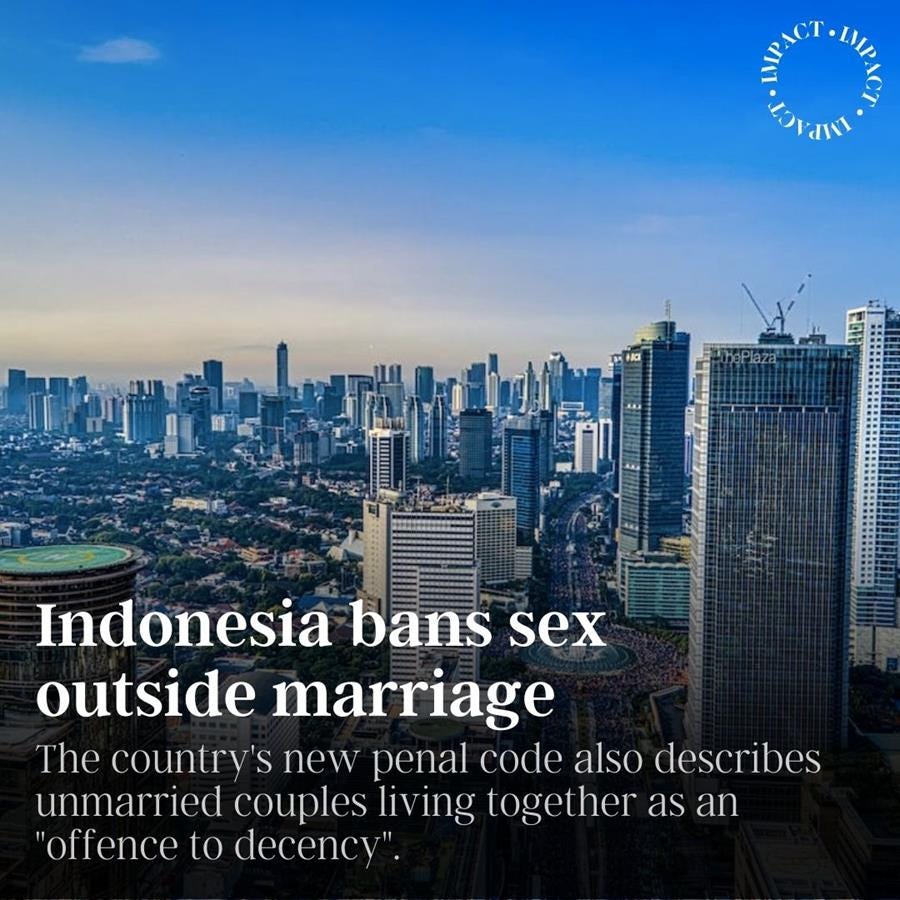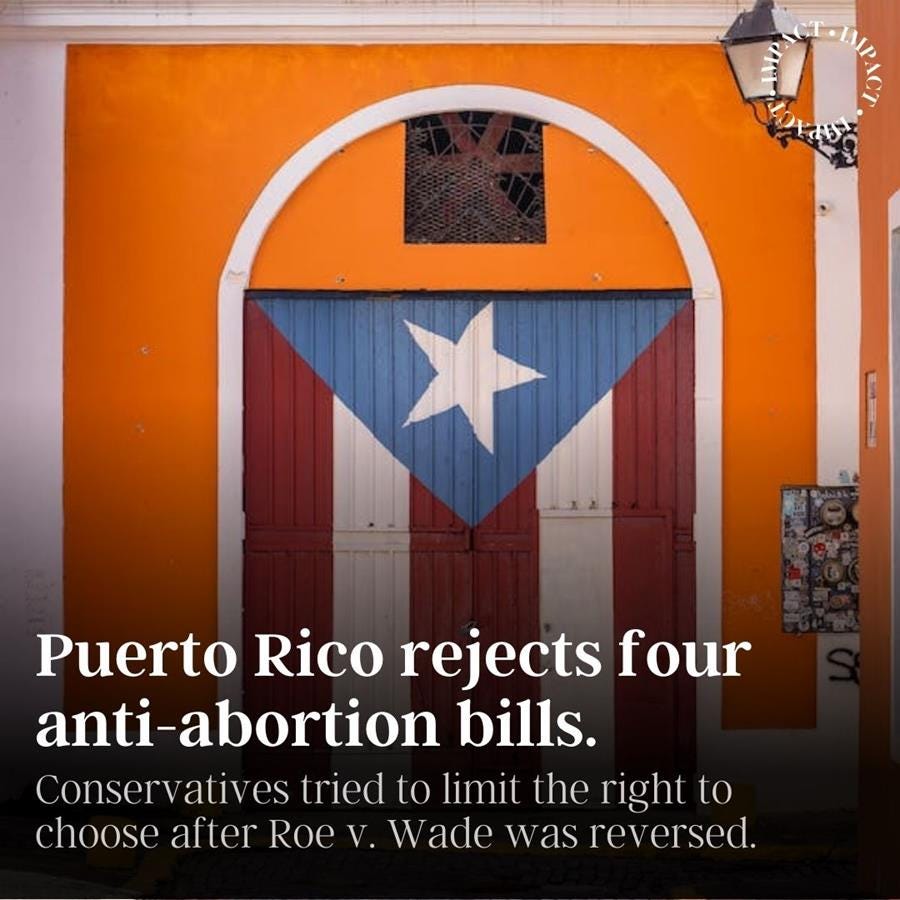What’s going on with Iran’s morality police?
By Agustina Ordoqui
The Wrap brings you all the latest news on women’s rights around the world, including:
🇮🇷 The latest on the protests in Iran
🇮🇩 Indonesia’s ban on sex outside marriage
🏳️🌈 New rights for LGBTQIA+ couples in
Tokyo
Read on for more. And if you want to be up-to-date on feminism worldwide, follow us on Twitter and Instagram.
INDONESIA — Indonesia will punish sex outside of marriage with up to a year’s imprisonment under a new penal code. Unmarried couples will also be prohibited from living together, with the code declaring cohabitation an ”offence to decency”. Abortion will remain illegal, and punishable by up to 10 years in prison, except in cases of rape. The penal code also bans insulting the president or state institutions and expressing any opinion contrary to Indonesia’s state ideology. Human rights groups have said the laws are ”toxic” and erode long-held freedoms. The code is expected to come into effect in three years’ time.
AFGHANISTAN — Women can no longer enter parks, fairs, gyms and other recreational spaces in Kabul following a Taliban ruling in November. This ban is just the latest to bar women from aspects of public life, joining earlier restrictions on access to education, most professional jobs and the ability to travel without a male guardian. Women are also required to wear a burqa in public spaces.
EUROPEAN UNION — The European parliament has passed new rules to ensure greater female representation on the boards of EU-listed companies. The Women on Boards directive will take two years to be implemented and will apply to all companies with more than 250 employees. The objective is for 40% of non-executive management positions and at least 33% of executive management posts to be held by women by June 2026. In cases where two candidates are equally qualified, priority must go to the under-represented sex. Member states will be obliged to sanction companies that fail to implement the rules.
IRAN —Reports circulated recently that Iran would dismantle its morality police to placate anti-regime protesters. The reports were based on statements made by the country’s prosecutor General Mohammad Jafar Montazeri in early December, but there has been no official confirmation, leading to confusion and scepticism. Mahsa Amini, a 22-year-old Kurdish woman, died in police custody in September, leading thousands of Iranians to protest against the authoritarian regime that has ruled the country since 1979. Authorities have cracked down on the uprising, leaving more than 300 dead and 15,000 detained. At least ten people have been sentenced to death for their participation in the protests.
NIGERIA — Women make up just one in ten candidates for Nigeria’s February 25 elections – 1,553 of the total 15,307 aspirants – according to the UN Women country office. It’s a significant drop from the previous election – nearly twice as many women went to the polls in 2019. Only one woman, Khadijah Okunnu-Lamidi, is running for president, and there is no female vice-presidential candidate. Nigeria has one of the lowest rates of women’s political participation in the world, with women representatives occupying just 7% of the seats in the senate and 4% in the house. In March, activists demonstrated outside the national parliament in Abuja to demand the passing of five gender bills, including one that would have guaranteed more seats for women in the house and senate. The bills are still in limbo.
NIGERIA — The Nigerian military has been running a secret programme to carry out forced abortions on women who were former captives of Islamist militants, according to an investigation by the Reuters news agency. Since launching its insurgency in 2013, the militant group Boko Haram has kidnapped thousands of women and girls, who were subject to rape and sexual slavery on a mass scale while in captivity, often resulting in pregnancy. The Nigerian military subsequently liberated many of them. Reuters journalists spoke to former Boko Haram captives who had been given abortions without consent in Nigerian army camps, as well as soldiers and guards who say they took part in the programme. Nigerian military leaders have denied the existence of the programme. Abortion is illegal in Nigeria, except in cases of risk to life.
ECUADOR — The constitutional court of Ecuador has suspended a law that established a number of legal hurdles for rape survivors seeking abortions. As a result, people whose pregnancy is the result of rape will be able to get an abortion without seeking judicial or medical authorisation. The original legislation making abortion available in cases of rape was passed early this year, and was considered a victory for feminists. Its content, however, was vetoed and modified by President Guillermo Lasso. Under Lasso’s amendments, rape survivors were required to file a complaint, make a statement, or undergo a medical exam in order to access an abortion. Now it will suffice to request the procedure in a medical centre.
PUERTO RICO — The Puerto Rican congress has rejected four initiatives that would have limited abortion rights on the island. The measures included a proposal for a referendum on abortion rights, the creation of an ”Unborn Heartbeat Act”, a bill to amend the penal code to restrict abortion and a block on the right to abortion after 22 weeks. The proposals were pushed by conservative parties after the US supreme court overturned Roe v. Wade last summer, ending the constitutional right to abortion. Puerto Rico currently has some of the most liberal abortion laws in the region – the procedure is available at any point during a pregnancy – but access can be difficult.
UNITED STATES — The state of Georgia has upheld a law restricting abortion after six weeks’ gestation. Judge Robert McBurney had initially annulled a ”trigger law” passed by state congress in 2019, which came into force after the supreme court overturned Roe v. Wade this summer. But the attorney general’s office filed an appeal in the state supreme court, which reversed McBurney’s ruling. The law makes it effectively impossible to have a legal abortion in Georgia.
UNITED STATES— The US congress has passed the Respect for Marriage Act, which enshrines the right to marry for same-sex and interracial couples under federal law. The bill will now pass to President Joe Biden to be signed into law. Same-sex marriage has been legal in the United States since a supreme court ruling in 2015, interracial marriage was legalised in 1967 after the Loving v. Virginia decision. The new legislation aims to protect these rights from being overturned by the supreme court, as Roe v. Wade, the ruling that allowed legal abortion nationwide, was earlier this year.
JAPAN — Tokyo has begun to officially recognise same-sex partnerships. These civil unions will have the same rights to housing, welfare and social benefits as heterosexual couples. But they will not have the right to inherit, nor to apply for a spousal visa. Meanwhile, a district court dealt a major setback to the LGBTQIA+ community by ruling that the country’s ban on same-sex marriage is constitutional. However, the court also pointed out that the lack of a legal system allowing same-sex couples to have families is a violation of their human rights.









